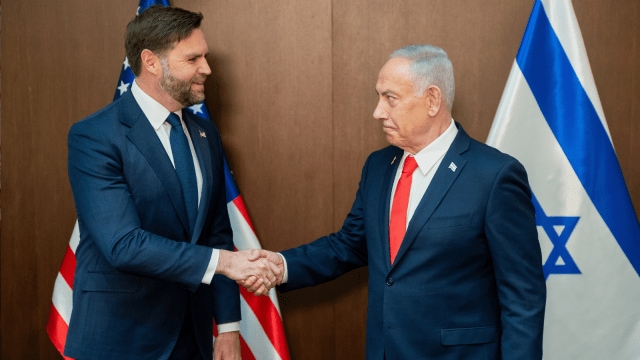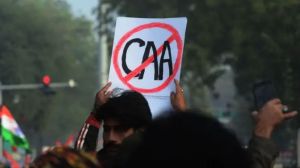Stay updated with the latest - Click here to follow us on Instagram
JD Vance criticises Israel’s parliament vote on West Bank annexation, calling it an ‘insult’
US Vice President JD Vance criticised Israel’s parliament vote on West Bank annexation, calling it an “insult” to Trump administration policies and international peace efforts.
 US Vice President JD Vance meets with Israeli Prime Minister Benjamin Netanyahu at the Prime Minister's Office in Jerusalem, on Wednesday, Oct. 22 (Image: AP)
US Vice President JD Vance meets with Israeli Prime Minister Benjamin Netanyahu at the Prime Minister's Office in Jerusalem, on Wednesday, Oct. 22 (Image: AP)US Vice President JD Vance criticised Israel’s parliament vote on West Bank annexation on Thursday, stating that it amounted to an “insult” and contradicted Trump administration policies, as well as efforts to maintain the US-brokered ceasefire between Israel and Hamas in Gaza.
On Wednesday, the Israeli parliament narrowly passed a symbolic preliminary vote in support of annexing the West Bank — a move widely interpreted as an attempt to embarrass Prime Minister Benjamin Netanyahu while Vance was still in the country. The bill was sponsored by parliamentary hard-liners, with only one member of Netanyahu’s Likud party joining them. With Netanyahu opposed, the bill is unlikely to pass the multiple votes required to become law.
Although much of Netanyahu’s coalition, including Likud members, support annexation, they have stepped back after US President Donald Trump publicly opposed such a move last month. The United Arab Emirates, a key US and Israeli ally in the Gaza peace process, has stated that annexation would constitute a “red line.”
Speaking on the tarmac of Tel Aviv’s Ben Gurion airport before departing Israel, Vance remarked, “If the Knesset vote was a political stunt, then it is a very stupid political stunt. I personally take some insult to it. The policy of the Trump administration is that the West Bank will not be annexed by Israel.”
The Palestinians seek the West Bank, captured by Israel during the 1967 Mideast war, as part of a future independent state. Israeli annexation of the territory would all but eliminate hopes for a two-state solution, widely regarded as the desired outcome by most of the international community.
Intense US push towards peace
Earlier this week, Vance announced the opening of a civilian-military coordination centre in southern Israel, where approximately 200 US troops are working alongside the Israeli military and delegations from other countries planning the stabilisation and reconstruction of Gaza.
Meanwhile, US Secretary of State Marco Rubio told journalists at Joint Base Andrews late Wednesday that he intends to visit the centre and appoint a Foreign Service official to work alongside the top US military commander in the Middle East, Vice Admiral Brad Cooper. The US is seeking support from other allies, particularly Gulf Arab nations, to establish an international stabilisation force for deployment to Gaza and to train a Palestinian police force.
“We’d like to see Palestinian police forces in Gaza that are not Hamas and that are going to do a good job, but those still have to be trained and equipped,” Rubio said. He also criticised efforts by far-right politicians in the Israeli parliament to annex parts of the occupied West Bank.
Trump “has made clear that’s not something we’d be supportive of right now, and we think it’s potentially threatening to the peace deal,” he added.
The bill passed by a 25–24 vote, though it remains uncertain whether it has sufficient support to gain a majority in the 120-seat parliament. Netanyahu has mechanisms to delay or defeat it.
Vance visits Holy Sepulchre
Vance also visited the Church of the Holy Sepulchre in Jerusalem’s Old City, the sprawling 12th-century basilica believed by Christians to be the site of Jesus’ crucifixion, death, and resurrection. On Wednesday, he sought to reassure that the Trump administration was not dictating terms to Israel.
“We don’t want in Israel a vassal state, and that’s not what Israel is. We want a partnership, we want an ally,” Vance said alongside Netanyahu, responding to a reporter’s question about whether Israel was becoming a “protectorate” of the US.
Netanyahu expressed similar sentiments, acknowledging differences of opinion while working to uphold the US-proposed ceasefire agreement. Israeli media have referred to the frequent visits of American officials to ensure Israel honours the fragile ceasefire as “Bibi-sitting,” using Netanyahu’s nickname, Bibi, in reference to a previous campaign ad portraying him as a trusted caretaker.
Palestinians in Gaza face dire medical needs
In the first medical evacuation since the ceasefire began on 10 October, the World Health Organization announced that 41 critically ill patients and 145 companions were evacuated from the Gaza Strip.
Tedros Adhanom Ghebreyesus, WHO Director-General, urged nations to show solidarity and assist the roughly 15,000 patients still awaiting approval to receive medical care outside Gaza.
His calls were echoed by a UN Population Fund official, who described the “sheer devastation” witnessed on a recent visit to Gaza, stating that “there is no such thing as a normal birth in Gaza now.”
Andrew Saberton, UNFPA Executive Director, explained the extreme difficulties faced by the agency due to the lack of functioning healthcare facilities. “One can’t be fully prepared for what one sees. The extent of the devastation looked like the set of a dystopian film. Unfortunately, it is not fiction,” he said. He added that Palestinian women often lack access to hospitals, sometimes giving birth in rubble or beside roads.
Court hearing on journalists’ access to Gaza
Separately, Israel’s Supreme Court held a hearing on Thursday regarding whether to open Gaza to international media, giving the state 30 days to present a new position in light of the ceasefire.
Israel has blocked reporters from entering Gaza since the outbreak of war on 7 October 2023. The Foreign Press Association (FPA), representing dozens of international news organisations including the Associated Press, requested that the court order the government to open the border.
In a statement after Thursday’s hearing, the FPA expressed “disappointment” and described the government’s position as “unacceptable.” The court had rejected an earlier FPA request due to security objections, and a second request was filed in September 2024. The government has repeatedly delayed the case.
Palestinian journalists have reported on the two-year conflict for international media but face severe restrictions, displacement, food shortages, and constant danger. Approximately 200 Palestinian journalists have been killed by Israeli fire, according to the Committee to Protect Journalists.
Tania Kraemer, FPA Chairperson, said, “It is time for Israel to lift the closure and let us do our work alongside our Palestinian colleagues.”



- 01
- 02
- 03
- 04
- 05




























